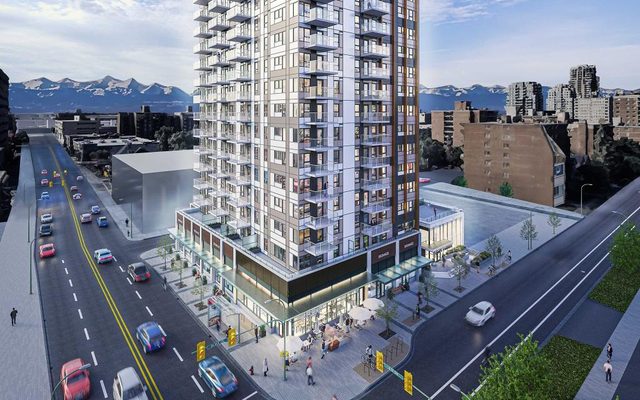Headlines over the past few years have conveyed, ad nauseam, a growing and problematic labour shortage in Canada’s construction industry. But that is no longer the case, says Residential Construction Council of Ontario president Richard Lyall.
RESCON represents residential builders in the province, focusing on labour relations, building-code reform and innovation, among other areas.
Lyall spoke to Green Street News about what challenges the industry is facing in today’s market: rapidly rising development charges, slow approvals processes and a lack of new projects moving into the construction stage, leaving some labourers out of work.
He also touched on where he’s seeing a few bright spots that prove positive change can happen, albeit on a smaller scale than is needed.
We’ve seen a lot more investment in rental development in the past couple of years. I wanted to get a sense of whether you think this is a temporary adjustment to market dynamics or is the interest in rental here to stay?
We’ve been under-producing purpose-built rental for decades, right? We had a great boom over the ’60s and ’70s, which was driven by demographics. It was a little bit different then, but the population was half of what it is today, and we produced as much housing in a year then as we have achieved in our best year recently, which is pretty extraordinary.
PBR has picked up – the federal government did a good thing there, cutting some of these sales taxes – so there’s been an uptick, but it’s not anywhere near where it should be. We’re not building, generally speaking, enough housing. That’s why we have a housing crisis. We need a lot more now, but we’ve got a bit of a moving target because of the housing-supply deficit and migration numbers and so on.
Knowing construction is not where it should be, what would you say is the biggest barrier to getting more housing built right now?
It’s interesting. I’ve been reading things where people say, “The industry has failed” or “The market’s not responding,” and you’ve probably seen some stuff on productivity being low on construction. Well, we don’t measure productivity well, and the big problem with productivity and construction is systemic. It’s taking longer and longer to get things built, and things are costing much more money, and that affects productivity numbers. That’s really the story there.
“It’s taking longer and longer to get things built, and things are costing much more money, and that affects productivity numbers”
Our construction industry is very productive, and we know that for no reason other than we’ve got a number of homegrown players here that are very active in the United States. They don’t have a problem down there, so, you know, it’s not the fiddler, it’s the fiddle.
Development charges and sales taxes on new housing have increased, for example, in Ontario in a number of jurisdictions by over 1,000% in less than a generation. Taxes, fees and levies are a runaway train, and it’s criminal.
That eventually will have to change because, right now, we’re still building out projects that sold a few years ago, but the pipeline for new projects – go out and ask the trade contractors what new projects are they bidding on right now, and there’s very little there. It’s bone-dry, and we’re starting to lay off people.
People are still running around talking about this labour-supply problem. We don’t have a labour-supply problem.
That’s the first I’ve heard anyone say that. We’re still seeing headlines about the need for more labourers to get developments built.
That’s the lag in information, the lag in data within the industry, right? People go, “What are you talking about? There’s still 222 cranes out here.” Those are projects that were sold two, three, four years ago.
Very little is selling now, and no one is starting new projects now. Very few. Low-rise was already in the dumps, but high-rise is in trouble.
When did you start to notice that switch?
It started a little bit over a year ago in the low-rise area because in low-rise, the time between the sale and the actual construction is much shorter than, say, multifamily. Sales dropped last year in low-rise, so we knew in about six months things were going to start slowing down there, and they did.
We’ve had hundreds of framers that aren’t working right now, and it’s starting in high-rise. It’s quite possible next year might be a little bit busier of a construction year than this year, but once we get into 2025, 2026, 2027, unless we have a big jump in purpose-built rental or you have a big jump in condo sales, contractors are not pricing much of anything with respect to new projects coming forward. They’ve been shelved. They’ve been iced.
Jumping back to development charges, the City of Burlington actually lowered its development charges earlier this year. What was the industry’s reaction to that?
There’s been a couple of bright lights where the problem’s been recognized. Burlington did something there, and Ottawa reduced their increase by a bit, but those are very much the exception rather than the rule. They say growth pays for growth. Well, that’s a lie. What they’re doing is, they’re passing on these fees to the first-time homebuyer, the renter.
“They say growth pays for growth. Well, that’s a lie”
The second thing is, in the City of Toronto’s case, Toronto is sitting on $7bn in reserves. A big chunk of that, around $3bn, is development charges that have been collected but not spent. So the growth is not paying. This money is not actually getting utilized.
One other issue you’ve spoken out about is the lengthy approval process for new construction. Has there been any positive movement on that front?
In certain jurisdictions, certain towns, there have been improvements. But, for example, in Toronto, it’s taking even longer, and that is a massive barrier. It’s a massive risk. If you’re thinking about doing a project, it affects your ability to finance. You want to be able to predict, “Okay, if we go ahead with this project, when can we start? When will it get approved?” So that whole situation is still a mess. It’s overly complicated.
We’ve known for years that we’re one of the worst jurisdictions in the developed world for getting things approved. We’ve been advocating at RESCON for the digitization and modernization of all this stuff for 10 years, and there really has been very little progress to date.
Some municipalities on their own are doing a few things here and there, and there are some little bright lights with new systems that have come in, but we’re just not nimble enough. This is where we’re just not managing growth properly, and we’ve got too many neophytes and non-technocrats with their fingers in the decision-making pie.
We’ve seen over the past few years a big increase in developments falling into receivership or developers having to declare bankruptcy. Has that had any effect on the construction side? Are contractors more wary of what jobs they accept?
That’s a good question. In the residential area, we’ve got a lot of very well-established contractors that have very well-established relationships with their trades. These are companies that have been in the business for decades, so if they go ahead and do something, the contractors that are working with them pretty much know it’s going to get done and it’s safe.




